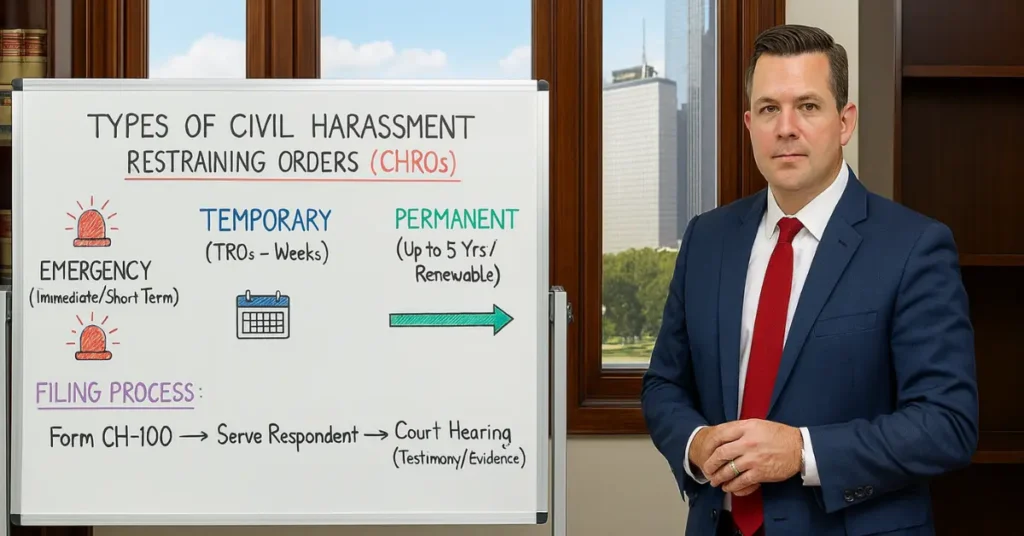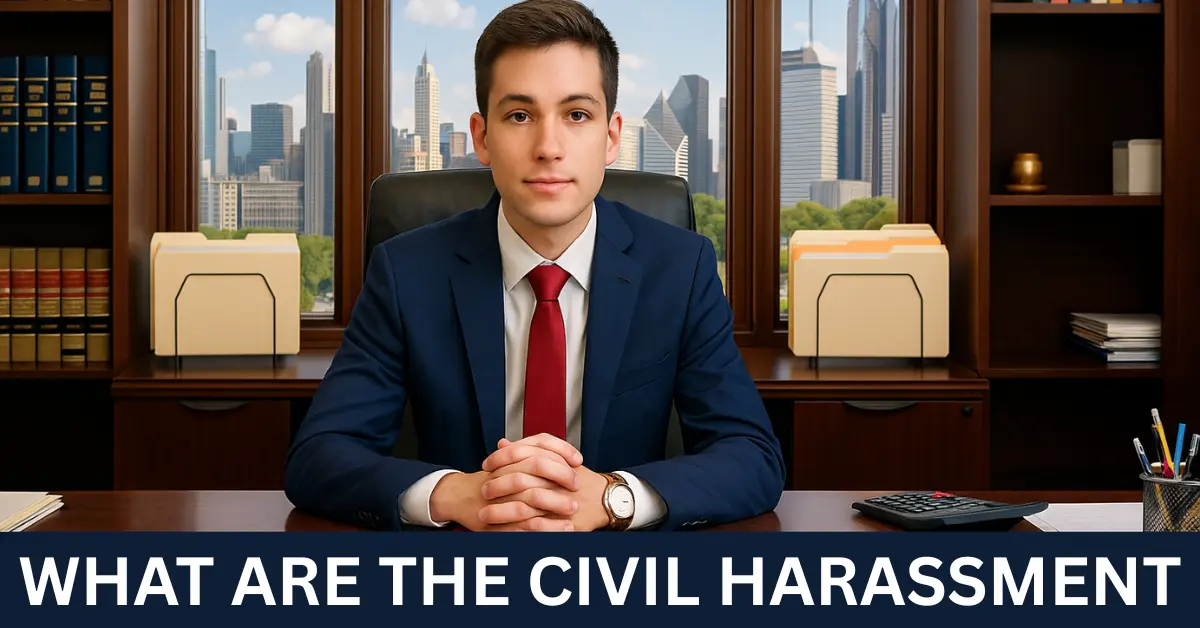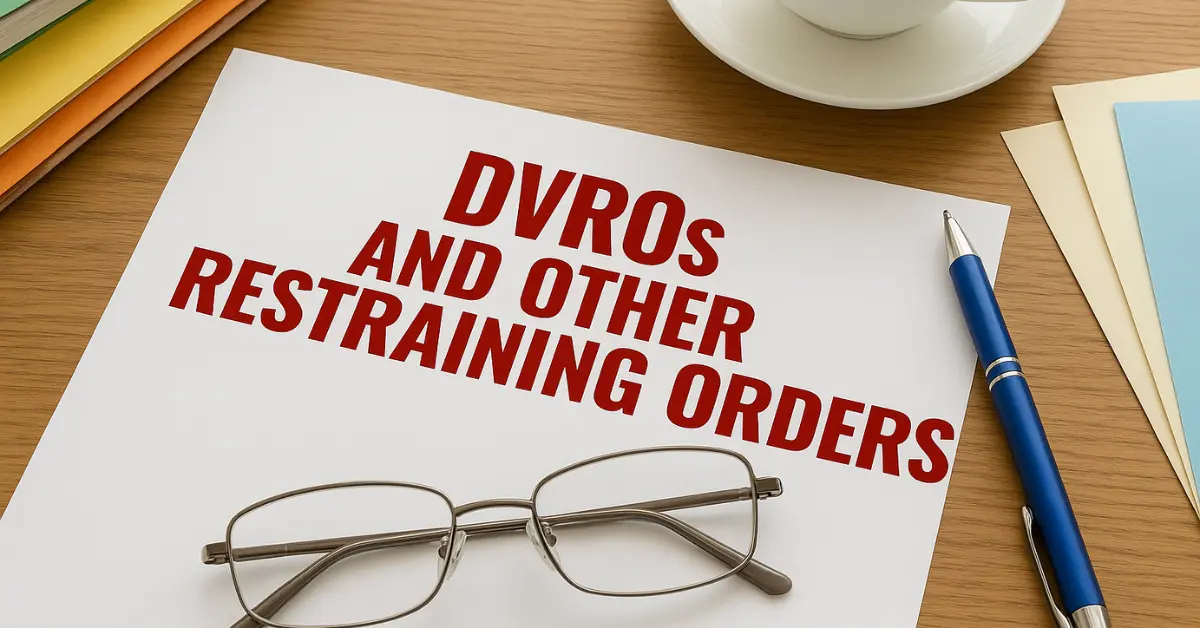A Civil Harassment Restraining Order (CHRO) is a legal measure designed to protect individuals from harassment by someone they are not in a close domestic relationship with, such as a neighbor, co-worker, or stranger.
Unlike domestic violence restraining orders, which address harassment or abuse within familial or intimate relationships, CHROs focus on harassment outside such bonds. They are critical tools for ensuring the safety and emotional well-being of individuals facing stalking, threats, or other forms of harassment.
By offering protective measures like no-contact orders and stay-away directives, CHROs empower victims to safeguard their personal space and mental health.
Legal Definition and Purpose
Under California Code of Civil Procedure § 527.6, “civil harassment” includes unlawful violence, credible threats of violence, or actions causing substantial emotional distress. These behaviors must be intentional, repetitive, and unwelcome.
For example, stalking repeated verbal threats, or continuous unwanted contact through digital platforms are grounds for seeking a CHRO. Eligible individuals include those harassed by someone they are not closely related to, such as a colleague or stranger.
This distinction underscores the purpose of CHROs in addressing harassment situations that fall outside the scope of domestic violence laws.
Who Can File a Civil Harassment Restraining Order?
Anyone experiencing harassment from an individual they are not closely related to qualifies to file a CHRO. Applicants can include minors represented by guardians or individuals acting on behalf of incapacitated victims.
Unlike Domestic Violence Restraining Orders, there are no relationship requirements; however, evidence proving harassment is essential. Minors aged 12 or older can also independently file in certain cases, ensuring access to legal protections for younger victims.

Types of Civil Harassment Restraining Orders
CHROs come in various forms to address different levels of urgency and duration.
Emergency Orders provide immediate relief to individuals at imminent risk of harm and typically remain effective until a court hearing is scheduled.
Temporary Restraining Orders (TROs) are short-term measures granted after the initial application is filed, often lasting a few weeks until the hearing date.
Permanent Restraining Orders offer long-term protection after a court hearing and can extend up to five years, subject to renewal if the harassment persists.
Filing Process
Filing for a CHRO involves several steps to ensure the application is complete and credible. Applicants must fill out forms like Form CH-100 to request the restraining order and may apply for a fee waiver if they cannot afford the filing fees. Once the forms are submitted, they must be served to the respondent by a neutral third party.
Following that, the court will set a hearing during which both parties may submit testimony and supporting documentation. The timelines for the process depend on the urgency of the situation, with TROs often granted quickly while permanent orders require more thorough hearings.
Evidence Requirements
Proving harassment requires credible and admissible evidence. Documentation such as text messages, emails, and photographs can provide crucial insights into the harasser’s behavior.
Witness testimony from individuals who observed the harassment or its impact is equally valuable.
In cases involving emotional or psychological distress, medical records or psychological evaluations can establish the severity of the harm caused. Courts emphasize the importance of verifiable evidence to ensure fair adjudication.
Legal Protections Offered
A CHRO provides a range of protections to safeguard victims from further harassment. These include no-contact orders that prohibit any form of communication, including calls or emails, and stay-away orders, which mandate a specified physical distance between the respondent and the victim.
Violating these orders can lead to serious consequences, including fines or imprisonment. By restricting behaviors such as stalking or harassment, CHROs create a safer environment for victims to live without fear.

Differences Between CHROs and Domestic Violence Restraining Orders
CHROs and domestic violence restraining orders differ primarily in the relationships they cover. While CHROs address harassment from individuals outside close familial or intimate relationships, domestic violence restraining orders focus on spouses, co-parents, or household members.
Additionally, the legal processes and evidence requirements for each order may vary, reflecting the unique circumstances of domestic violence versus civil harassment cases.
Challenges in the CHRO Process
Applicants often face challenges, including the difficulty of proving harassment, especially when the evidence is circumstantial. Legal representation can be costly, making it harder for low-income individuals to navigate the process.
However, resources such as pro bono legal aid and self-help centers can mitigate these challenges. Strategies like collecting thorough documentation and seeking witness support can also strengthen a case.
Resources and Support
Individuals seeking CHROs can access resources such as court self-help centers and organizations like Women’s Law, which provide guidance on filing procedures and evidence collection.
Many courts also offer step-by-step guides and referral services for free or low-cost legal aid. These resources play a vital role in empowering victims to pursue legal protections effectively.
Conclusion
Civil Harassment Restraining Orders are essential legal tools for safeguarding individuals from harassment outside domestic relationships. They provide a structured framework to prevent harassment and ensure victims’ safety through comprehensive protections.
Anyone experiencing harassment should explore legal remedies like CHROs and seek assistance from legal experts or support organizations to navigate the process successfully. By doing so, they can reclaim their peace of mind and personal security.




